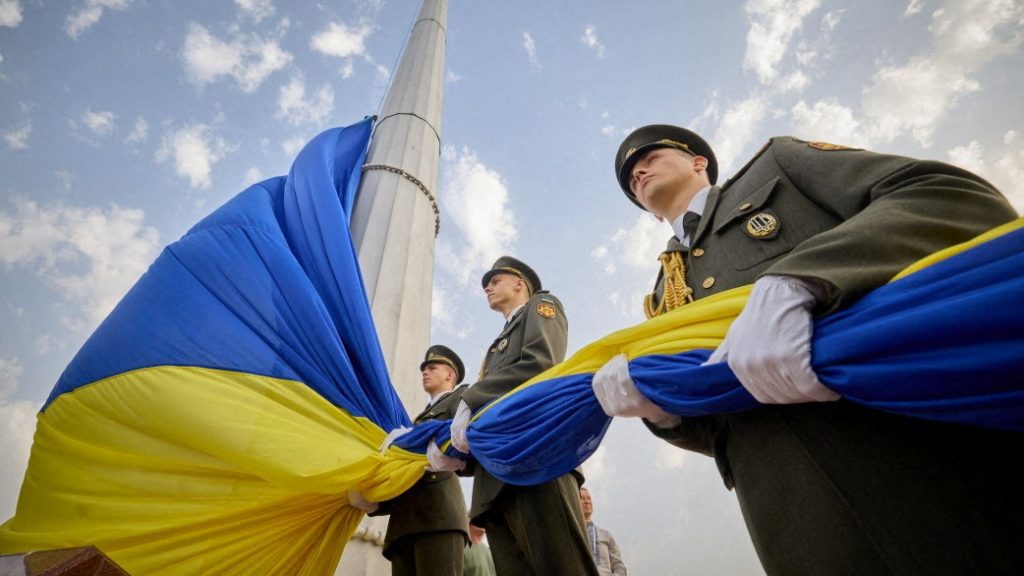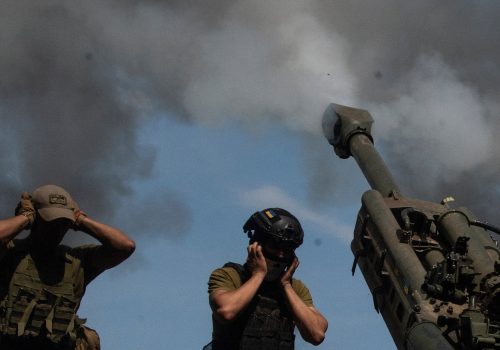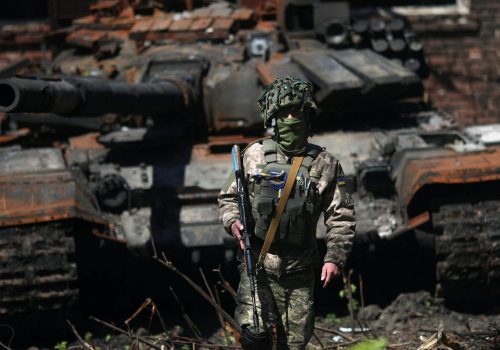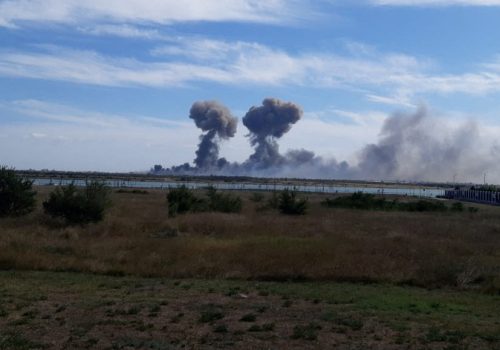August 24 is Ukrainian Independence Day. For the first time in three decades since Ukraine regained its independence, there was a real danger this year that the holiday would not take place at all. Exactly six months earlier on February 24, Russia launched a full-scale invasion of the country with the aim of crushing Ukrainian statehood and extinguishing the Ukrainian nation. The genocidal war unleashed by Vladimir Putin in early 2022 is unparalleled in modern European history. It is also a wake-up call for the many Europeans still in denial over the threat facing the continent from a hostile Russia.
So far, the Kremlin’s criminal plans have been thwarted by Ukrainian strength and courage. An invasion that was supposed to end victoriously in just three days is now entering its seventh month with no end in sight. Putin dreamed of parading his soldiers through a conquered Kyiv. Instead, on the eve of Independence Day, Ukraine unveiled a “parade” of destroyed Russian tanks in the heart of the capital.
While Ukraine’s successes are encouraging, there is no doubt that Russia has not abandoned its plans to destroy Ukraine. On the contrary, Moscow appears more determined than ever to proceed with its genocidal agenda, whatever the cost. The recent public call from a senior Russian ambassador to show “no mercy to the Ukrainian population” was the latest in a long line of official statements underlining Russia’s intention to annihilate Ukraine.
This is well understood by Ukrainians, who appreciate that they are fighting not only for their country’s independence but for their survival as a nation. However, there are still indications that many in Europe refuse to acknowledge the scale of the Russia problem facing the international community.
The current war is not just about Ukraine. It is a struggle to determine who gets to set the rules the whole world will live by. The confrontation actually began eight years ago with the Russian occupation of Crimea. This year’s full-scale invasion marked a major escalation in Russia’s ongoing campaign to wipe Ukraine off the political map of Europe and undermine the foundations of the existing world order.
Ever since Vladimir Putin’s shameless denials during the Russian seizure of Crimea in spring 2014, the Kremlin has placed barefaced lies at the heart of its diplomacy. Moscow has routinely violated international law while protesting its innocence. The existing international institutional architecture has proved powerless when confronted by this Russian cynicism. The United Nations, the OSCE, the ICRC and others have all failed to prevent Russia from waging war and have been unable to impose meaningful consequences on the Kremlin.
Unsurprisingly, this has only served to encourage further Russian aggression. We have now reached the stage where Russia is openly waging a genocidal war while at the same time engaging in nuclear blackmail. Kremlin officials and regime proxies regularly threaten Europe with the prospect of nuclear attack, while the Russian military is currently using the seized Ukrainian atomic energy plant in Zaporizhia to hold the wider international community hostage.
It is increasingly obvious that dramatic changes are needed in order to avoid a further deterioration in the global security climate. International institutions that were founded to serve as pillars of a more civilized world have evidently lost their way and need to go back to basics.
The most recent example of this malaise was the deeply flawed report published by Amnesty International in early August, which completely failed to acknowledge the circumstances of Ukraine’s fight for survival and denied Ukrainians the right to defend themselves. The fact that Amnesty International’s report was enthusiastically embraced by the Kremlin and deployed to justify ongoing Russian war crimes in Ukraine spoke volumes about the moral morass which much of the international community now finds itself in.
The Russian invasion has also exposed the extreme reluctance among many of the world’s wealthiest and most developed nations to leave their comfort zone and defend the core principles of Western civilization. This is perhaps due to long decades of peace and rising prosperity, which have created the illusion of a world where the horrors of military aggression are consigned to the barbaric past.
Such delusions place today’s tyrants at a distinct advantage. They are able to seize the initiative and in many instances advance their agenda undetected until the damage has already been done. One good example of this trend is the international expansion of Russia’s propaganda media empire, which has grown rapidly over the past decade while many have turned a blind eye or dismissed the phenomenon as “just a dissenting opinion.” In reality, Russia has been able to establish a powerful Kremlin-controlled information apparatus dedicated to undermining Western societies from within. Countries cannot effectively defend themselves if they refuse to acknowledge they are under attack.
Stay updated
As the world watches the Russian invasion of Ukraine unfold, UkraineAlert delivers the best Atlantic Council expert insight and analysis on Ukraine twice a week directly to your inbox.
The prevailing mood of denial in Europe has allowed Russian society to wholeheartedly embrace an anti-Western fascist ideology while at the same time enjoying the benefits of Western civilization. Moscow actively attacks Western values and routinely depicts the United States, NATO, and the European Union as implacable adversaries. At the same time, the Kremlin elite and Russia’s middle classes send their wives and children to live in the hated West and take advantage of Europe’s superior education and healthcare opportunities. They buy up Western real estate, invest in Western businesses, settle their disputes in Western courts, and keep their savings in the same Western currencies they preach against.
Russians have grown used to the idea that they can use violent rhetoric, violate international norms, and even invade their neighbors with impunity. They are supremely confident that Western leaders will nevertheless seek to maintain dialogue with Moscow.
This has fostered a culture of contempt. Not unreasonably, Russians believe the West has no stomach for confrontation and is utterly unable to defend the values it so readily betrays. After years of engaging with the perceived hypocrisy of the West, Russians see nothing wrong in professing their hatred for democracy while enjoying its fruits. Likewise, they are entirely comfortable calling Ukrainians “brothers” and in the same breath proclaiming that Ukraine itself cannot be allowed to exist.
Until this absurd situation is addressed, there is little hope of ending Russian aggression. Instead of viewing the country as a difficult partner or a competitor, the West must acknowledge that today’s Russia is an unambiguously hostile power that is waging war against the entire democratic world.
One key measure would be to declare Russia a state sponsor of terrorism. A small number of countries have already taken this step, but others including the United States remain reluctant. Skeptics argue that such a move would lead to unwelcome consequences that should be avoided. This is a slippery slope. Experience since 2014 demonstrates that failing to respond forcefully to Russian aggression only leads to bigger problems and higher costs further down the line. Rather than seeking compromises with a hostile power, Western leaders should designate Russia a state sponsor of terror without delay.
Europe must also deploy its considerable soft power tools to demonstrate that the days of double-dealing are over. You cannot expect to drive luxury German cars while scrawling “to Berlin” slogans on Russian tanks and parading them on state TV as symbols of national identity. You cannot expect to drink French wine or Viennese coffee while simultaneously threatening to nuke Europe.
Sanctions should be tightened and loopholes closed. Russian citizens should face a Schengen Zone tourist visa ban, with only humanitarian cases permitted to enter the EU. A wealth of evidence indicates that the vast majority of Russians support the war in Ukraine. They need to understand that they will face negative consequences for the war crimes being committed in their name.
Until the Russian middle classes begin to lose access to the trappings of Western civilization, they will continue to dismiss Western criticism of Russia as hypocritical and insincere. Once they are denied access to the privileges they previously took for granted, serious change in Russia may finally become possible. This will not happen overnight, of course. But until the current double standards are addressed, there is no chance whatsoever of Putin facing genuine domestic pressure.
Eurasia Center events

Ukraine is celebrating Independence Day for the thirty-first time this week precisely because Ukrainians are prepared to fight for their country and defend their choices. Many of our Western partners were initially guilty of underestimating the strength of Ukrainian society, much as they underestimated the transformations taking place within Ukraine’s state apparatus and the Ukrainian military.
Thankfully, this is no longer the case. Ukraine has impressed the watching world during the first six months of the Russian invasion and has received colossal support from our partners. This has included large quantities of everything from artillery and MLRS systems to armored vehicles and ammunition.
Thanks to the leadership of the United States and Defense Secretary Lloyd Austin III personally, the Ukraine Defence Contact Group has been established bringing together more than 50 nations in the Ramstein Format. Under the leadership of UK Secretary of State for Defence Ben Wallace, a series of donor conferences have been held to support Ukraine. This initiative was expanded thanks to the active stance of Denmark and Defense Minister Morten Bødskov. As a result, we now enjoy particularly strong support from a number of North European states.
From the very first days of the invasion, Ukraine has received unprecedented support from the Polish government and nation. Our trusted friends from Lithuania, Latvia, and Estonia have stood by us during what have been some of the toughest moments in our modern history. We deeply appreciate the support of our Turkish partners together with Canada, Italy, the Netherlands, Belgium, France, Australia, the Czech Republic, Slovakia, Germany and many other states. I am happy to report that the list of Ukraine’s partners is extensive and continues to grow.
Half a year after the launch of Russia’s invasion, it is evident that Ukraine is no longer a post-Soviet state. Instead, Ukraine has returned to its historic position within the family of European nations. This return was formalized in summer 2022 when the European Union granted Ukraine official EU candidate nation status. I only wish this success had not come at such a staggering price.
Ukraine’s further integration will benefit Europe as a whole. The events of the past six months have illustrated that Europe will become significantly more secure if it recognizes that Ukraine can serve as a shield in the east. Europe has a Russia problem and a strong Ukraine is the obvious solution.
Ukraine has already provided ample evidence that Russia will back down whenever it encounters serious resistance. On multiple occasions, Russian troops have responded to battlefield setbacks with retreats disguised as “goodwill gestures.” The lesson for advocates of appeasement could not be clearer: failure to confront Russia will lead to escalating aggression, whereas a firm response will force Russia to back down and withdraw.
Military support for Ukraine is already bringing security benefits for the whole of Europe. Since the invasion began, Ukraine has succeeded in seriously weakening the Russian military. Around 45,000 Russian soldiers have been killed including approximately one-third of the Kremlin’s elite troops. More than 1000 Russian tanks have been captured or destroyed, along with hundreds of fighter jets and helicopters. Key successes have included the sinking of the Russian Black Sea Fleet flagship, The Moskva, victory in the Battle for Kyiv, and the liberation of Snake Island.
This has shifted the military balance of power on Europe’s northeastern flank, with the threat to Scandinavia and the Baltic states now noticeably reduced. Additional military backing for Ukraine will lead to further reductions in Russia’s ability to menace its neighbors and the wider European community.
The Kremlin is counting on Western weakness and believes European leaders will ultimately cave in when confronted by a combination of rising economic costs and escalating terror tactics. If this expectation proves correct, the consequences for European security will be disastrous. Instead, it is in Europe’s best interests to provide Ukraine with the tools it needs to finish the job of defeating Putin.
Oleksii Reznikov is Ukraine’s Minister of Defense.
Further reading
The views expressed in UkraineAlert are solely those of the authors and do not necessarily reflect the views of the Atlantic Council, its staff, or its supporters.

The Eurasia Center’s mission is to enhance transatlantic cooperation in promoting stability, democratic values and prosperity in Eurasia, from Eastern Europe and Turkey in the West to the Caucasus, Russia and Central Asia in the East.
Follow us on social media
and support our work
Image: Members of the Honor Guard mark the Day of the State Flag, amid Russia's attack on Ukraine, in Kyiv, Ukraine August 23, 2022. (Ukrainian Presidential Press Service/Handout via REUTERS)




